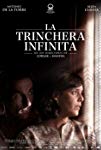Eye For Film >> Movies >> The Endless Trench (2019) Film Review
The Endless Trench
Reviewed by: Amber Wilkinson

Antonio de la Torre - who British audiences might have caught in The Realm when it got a brief cinema release - continues to burnish his credentials as one of the best Spanish actors of his generation with his latest role in The Endless Trench. The historical drama also marks a welcome return to form for Basque filmmaking trio Aitor Arregi, Jon Garaño and Jose Mari Geonaga, who followed their multi-award winning debut Flowers with the rather plodding costume drama Giant. Their first film in Castilian Spanish - written by Geonago and Louis Bendega - considers the plight of those who were forced to hide from Franco's fascists, not just for the duration of the Spanish Civil War, but for three decades.
Although a fictional retelling, the film draws on the stories of many of those who hid behind false walls or floors in their homes, including Manuel Cortés, the former mayor of the village of Mijas, whose temporary hideout in his father's house became his prison for 30 years. It's the second time in a year that de la Torre has played a long-term captive - after last year's retelling of ex-Uruguayan president José Mujic's incarceration, A Twelve-Year Night. Where that film focused on the horrors that solitude can bring to prisoners, The Endless Trench marries its effective prison drama element to a relationship drama, artfully highlighting the impact of hiding out, not just on those forced to do it but on their loved ones, who were effectively their sole protectors and who also lived in fear of discovery.
Arregi, Garaño and Geonago's film begins with the adrenaline rush of flight, as Republican Higinio Blanco (de la Torre) and his fellow fighters run for their lives. It is here that the sense of entrapment begins, as Higinio takes what he imagines will be temporary refuge in a priesthole style space he has dug behind the fireplace he shares with his new bride Rosa (Belén Cuesta, in a finely nuanced performance). What starts as a temporary refuge starts to become more permanent after their neighbour - who blames Hidigio for the death of his brother - starts what will become a lifelong obsession with the missing man's whereabouts.
Hidigio and Rosa are in the full spate of young love at the start of the film, but as the years stretch on - and Hidigio is moved to fractionally larger accommodation in his father's house in a false wall behind a bureau, practicalities intervene. She wants children and, perhaps more worringly for both of them, she begins to attract the attentions of other men who believe that she is a widow.
The film captures the sense of fear that comes with every move outside his bolthole that Hidigio makes, and the shared entrapment of Rosa, who is almost as incarcerated as he is, since she is the only one who can keep him alive - the actors generate tension in every detail here, whether it's a furtive glance through a net curtain or the stiffening of a body when threat is close at hand. Little details abound, such as the fact he soon has to sport women's cardigans, since she can't be seen to be buying men's clothes. Through a subsidiary character, we also come to learn how it was possible for people on either side of the political divide to 'disappear' without much being done.
As the years wear on, we see how situation grinds the couple and, subsequently, their son, who is forced to pretend his mother is his aunt and deny his dad's existence. The film also emphasises the way that fear can paralyse. It could be argued that one or two incidents feel slightly forced - not least a gay subplot - but even they ultimately serve the fabric of the film, to build a bigger picture of the persecution and oppression of the Franco regime. The production design is handsome, emphasising the sense of being hemmed in but it is the psychological claustrophobia that develops between Rosa and Hidigio that carries the most emotional weight. De la Torre, in particular, has set down a marker for next year's Goyas.
Reviewed on: 26 Sep 2019
















